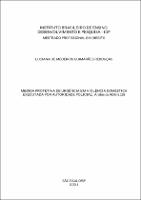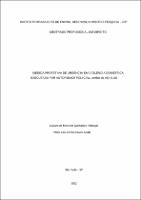Use este identificador para citar ou linkar para este item:
https://repositorio.idp.edu.br//handle/123456789/4695| Título: | Medida protetiva de urgência em violência doméstica executada por autoridade policial: Análise da ADIn 6.138 |
| Autor(es): | Rebouças, Luciana de Medeiros Guimarães |
| Orientador(es): | Abade, Denise Neves |
| Palavras-chave: | Convenções internacionais;Lei Maria da Penha;Lei 13.827/2019;Medida Protetiva de Urgência |
| Data de submissão: | 2023 |
| Editor: | Instituto Brasileiro de Ensino, Desenvolvimento e Pesquisa |
| Citação: | REBOUÇAS, Luciana de Medeiros Guimarães. Medida protetiva de urgência em violência doméstica executada por autoridade policial: Análise da ADIn 6.138. 2023. 104 f. Dissertação (Mestrado Profissional em Direito) - Instituto Brasileiro de Ensino, Desenvolvimento e Pesquisa, São Paulo, 2023. |
| Resumo: | O aumento do índice de violência doméstica no Brasil expressa a necessidade de criação e
aprimoramento dos mecanismos de combate à violência contra mulher. Frente a esse cenário,
optando-se metodologicamente pela pesquisa bibliográfica e documental, com ênfase na
legislação nacional, convenções internacionais e em pesquisas acadêmicas e científicas já
realizadas sobre a temática, buscou-se analisar a possibilidade de adoção de medida protetiva
de urgência por autoridade policial em situações de violência doméstica, à luz da alteração
legislativa promovida pela Lei 13.827/2019. Como objetivos específicos, partiu da estruturação
do fenômeno violência doméstica no Brasil e apresentou os dados indicadores do crescimento
desta espécie de violência, não obstante a adesão do Brasil a convenções internacionais sobre
erradicação de discriminiação e violência contra a mulher. Investigou a historicidade por trás
deste fenômeno, com o intuito de demonstrar a necessidade de implementar e evoluir os
instrumentos a fim de viabilizar a observância à dignidade da pessoa humana em sua dimensão
cultural. Reconhecendo que a aplicação das medidas protetivas de urgência, exclusivamente,
por autoridades judiciárias, por vezes pode impedir uma pronta resposta em defesa das vítimas,
se debruçou sobre a alteração promovida pela Lei 13.827/2019 na Lei 11.340/2006, responsável
pela inclusão do art. 12-C, que simboliza um paradigma no combate a este fenômeno. Para
tanto, analisou o julgamento da Ação Direta de Inconstitucionalidade (ADIn nº 6.138), através
da qual foi discutida a (in)constitucionalidade da alteração. Ao final, foi realizada uma análise
da Lei Maria da Penha e das medidas protetivas de urgência no âmbito do Estado da Bahia.
Esta pesquisa concluiu que, diante do contexto histórico-estruturante de violência institucional
e cultural a que se encontram submetidas as mulheres, bem como da dificuldade estrutural do
judiciário baiano em acompanhar situações de violência presentes no cotidiano, a previsão do
art. 12-C se apresenta como uma inovação sem precedentes, podendo contribuir para amenizar
a conjectura atual. |
| Abstract: | The increase in the rate of domestic violence in Brazil expresses the need to create and improve mechanisms to combat violence against women. Faced with this scenario, methodologically opting for bibliographical and documentary research, with emphasis on national legislation, international conventions and on academic and scientific research already carried out on the subject, an attempt was made to analyze the possibility of adopting an urgent protective measure by an authority police in situations of domestic violence, in light of the legislative amendment promoted by Law 13.827/2019. As specific objectives, it started from the structuring of the phenomenon of domestic violence in Brazil and presented data indicating the growth of this type of violence, despite Brazil's adherence to international conventions on the eradication of discrimination and violence against women. It investigated the historicity behind this phenomenon, with the aim of demonstrating the need to implement and evolve the instruments in order to enable the observance of the dignity of the human person in its cultural dimension. Recognizing that the application of urgent protective measures, exclusively by judicial authorities, can sometimes prevent a prompt response in defense of the victims, it focused on the amendment promoted by Law 13.827/2019 in Law 11.340/2006, responsible for the inclusion of art. . 12-C, which symbolizes a paradigm in combating this phenomenon. Therefore, it analyzed the judgment of the Direct Action of Unconstitutionality (ADIn nº 6.138), through which the (un)constitutionality of the alteration was discussed. In the end, an analysis of the Maria da Penha Law and the urgent protective measures within the scope of the State of Bahia was carried out. This research concluded that, given the historical-structuring context of institutional and cultural violence to which women are subjected, as well as the structural difficulty of the Bahian judiciary in monitoring situations of violence present in everyday life, the prediction of art. 12-C presents itself as an unprecedented innovation, which may contribute to softening the current conjecture. |
| URI: | https://repositorio.idp.edu.br//handle/123456789/4695 |
| Aparece nas coleções: | Mestrado Profissional em Direito, Justiça e Desenvolvimento - São Paulo |
Arquivos associados a este item:
| Arquivo | Descrição | Tamanho | Formato | |
|---|---|---|---|---|
| Dissertação_LUCIANA DE MEDEIROS GUIMARÃES REBOUÇAS_Mestrado_2023.pdf | 1.89 MB | Adobe PDF |  Visualizar/Abrir | |
| DISSERTAÇÃO_LUCIANA DE MEDEIROS GUIMARÃES REBOUÇAS_MESTRADO PROFISSIONAL EM DIREITO_2022.pdf | 878.77 kB | Adobe PDF |  Visualizar/Abrir |
Os itens no repositório estão protegidos por copyright, com todos os direitos reservados, salvo quando é indicado o contrário.
